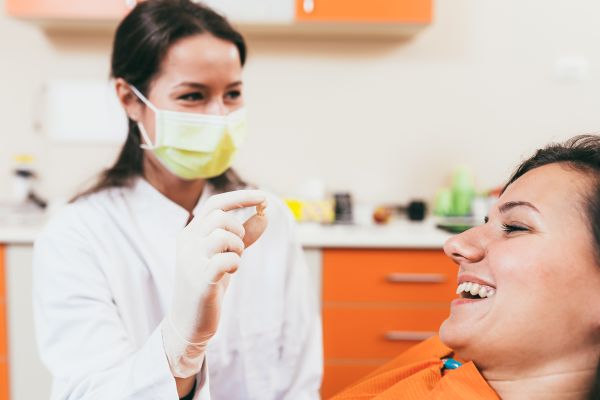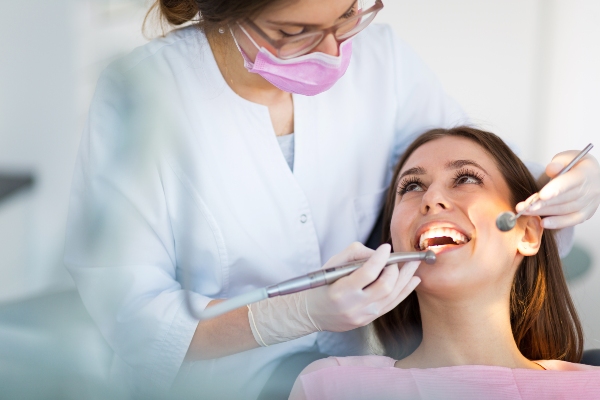What Will Happen After a Tooth Extraction?

A tooth extraction might be recommended when a tooth has been damaged to a point it cannot be repaired with any of the treatments currently available, or if it becomes infected and threatens other parts of the body.
Tooth extractions
The thought of having to get a tooth extraction can be nerve-wracking for many people. In reality, tooth extractions are not as bad as they might seem. Despite the discomfort and bleeding, tooth extractions are actually pretty simple and straightforward. Local or general anesthetics are used during the process so the patient does not feel anything, thus eliminating the chance for pain.
The two types of extractions commonly performed are surgical and simple extractions. Simple extractions are a more straightforward approach. The technique is used when there is enough of the tooth visible to pull it out of the mouth. Surgical extractions are used when the dentist needs to make an incision to reach the tooth. It is often used when extracting teeth that are stuck in bone or gum tissues. A dentist might opt to break a tooth into smaller pieces during a surgical extraction if that makes it easier to pull out the tooth.
Recovering after tooth extraction
It can take up to two weeks to recover from a tooth extraction. The most crucial part of the healing process takes place during the first three days. Patients might experience pain and discomfort as the anesthetic used wears off after an extraction. The site of the extraction will likely bleed for a couple of hours until a blood clot stops the bleeding. Biting down on gauze helps to slow down the bleeding.
Dentists recommend only eating liquid and soft foods for the first week after a tooth extraction. Such foods are less likely to irritate the site. Avoid brushing or flossing the arear around the extraction for the first few days since that can lead to irritation as well. Rinsing the mouth with salt water after meals helps to keep it clean during this period.
Prescription or over-the-counter painkillers can be used to manage any pain and discomfort experienced after having a tooth pulled. Patients are free to return to their oral hygiene routine after the first three days have passed. They should avoid the site of the surgery while doing this to prevent dislodging the blood clot that forms in the socket. Using a straw or spitting can also lead to the clot coming off.
Keeping the mouth as clean as possible reduces the risk of infection as the tooth extraction site heals. Habits like smoking can reduce the immune system's ability to fight off infection, which is why it is essential to avoid it.
Find out more
While pain and discomfort are both parts of the recovery process after a tooth extraction, the procedure is typically performed to address a bigger issue that can cause significantly more pain and discomfort. Call or visit our Marietta clinic if you have an oral problem that might require extraction.
Request an appointment here: https://www.mytotaldentistry.com or call McCarthy Dentistry at (740) 546-5178 for an appointment in our Marietta office.
Check out what others are saying about our services on Yelp: Read our Yelp reviews.
Recent Posts
Dental implants provide a long-term solution for those missing teeth, improving oral health and function. However, patients should learn as much as possible before the procedure to ensure the most effective treatment outcome. Asking the right questions during a consultation can help you make informed decisions about your oral health. Here are five essential questions…
Dental implants offer more than just cosmetic benefits. They restore oral function, improving speech and chewing efficiency while preserving jawbone structure. These long-lasting solutions provide stability and durability, making them a preferred choice for patients who want to replace one or more missing teeth.Missing teeth can impact speech clarity. Gaps between the teeth may lead…
Dental implants provide a durable and natural-looking solution for missing teeth. This popular teeth replacement option can last many years with proper care, improving the function and appearance of your smile. Practices like following a good oral hygiene routine, adopting healthy lifestyle habits, and scheduling regular follow-ups can all help contribute to the overall longevity…
If you find yourself with TMJ, you need to head to a TMJ dentist immediately. TMJ, or temporomandibular joint dysfunction, is a serious condition of the jaw that can cause everything from pain and irritation to complete inability to move the jaw. This condition can grow more serious by the day, so if you are…


